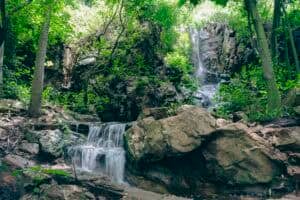Warning signs prohibiting swimming, picnic and fishing were recently erected around the dam.

At least 90 adult crocodiles are still at large in the area and rivers around Da Gama Dam, after a dam wall, forming a safe enclosure, broke at the end of January due to the rain in the area.
The escape of 150 in January was reported to the Mpumalanga Parks and Tourism Agency (MTPA) officials by the farm owner, John Cowley. The MTPA confirmed that he had received a permit to capture and transport the crocodiles on February 5.
Cowley, his workers and the MTPA retrieved about 50 crocodiles.
Others escaped to the White Waters River that feeds Da Gama Dam.
The dam walls of Nola Farms near Hazyview gave way due to elevated dam levels brought on by the continual rains at the end of January. The dam contained around 150 crocodiles, most of which escaped to the adjacent overflow stream of Da Gama Dam and the White Waters River. About 62 of them have been recovered.
ALSO READ: Hunt for crocodiles continues in Western Cape
According to the MTPA, the agency also received reports of crocodile sightings near the boathouse at Da Gama Dam. A photo of one of the crocodiles, allegedly taken at Da Gama, was sent to the agency.
“This is a catastrophe,” said MTPA spokesperson, Kholofelo Nkambule. “These highly intelligent, prehistoric creatures are different from wild crocodiles. They were raised and fed by humans. When they hear humans they will come closer in anticipation of food.”
According to the MTPA, a number of the crocodiles moved upstream into Da Gama Dam.
“This is a dam where people swim and catch fish – it’s a disaster. We urge the public to refrain from these activities until further notice,” said Nkambule.
Although the photo of one crocodile near the boathouse at Da Gama Dam confirmed its presence, Robert Buchanan, commodore of Forest Sailing Club, is unaware of any sightings.

This stream became flooded, causing the dam wall of the crocodile enclosure to collapse.
Warning signs prohibiting swimming, picnic and fishing were recently erected around the dam.
“We had to erect the warning signs as prescribed by the Department of Water Affairs, but as far as I know, no one has seen a crocodile in the dam. Residents are keeping an eye open and if a crocodile is spotted we will contact the relevant authorities and have it captured.”
ALSO READ: Six more crocodiles recaptured after escaping at Western Cape farm
Sightings as far as six kilometres downstream in the North Sand River were reported to MTPA.
“Almost 100 large crocodiles in a six-kilometre stretch are an over-saturation. This, in addition to their tame nature leads us to predict increased human-crocodile interactions in the near future in this area,” Nkambule said.
Crocodiles were also reported in farm dams in the Kiepersol area.
“The escaped crocodiles could have travelled far in the month since the incident. Ecologically, this will have a negative impact because they might prey on cattle, tons of fish and even humans,” added Nkambule.
The MTPA has set up cage traps in the White Waters River to catch as many of the remaining ones as possible. A total of 12 were caught this way last week.
Cowley told Lowvelder that he believes there were crocodiles in the rivers and in the Da Gama Dam before his dam wall broke, although the warning signs at the dam were only erected after this incident.
This is contradictory to what Buchanan of the Forest Sailing Club said.

New signs around Da Gama Dam, warning of possible crocodile presence.
Cowley added that he and his team on the farm tried everything in their power to prevent the dam from overflowing.
“We knew the storm was coming, so we pumped the dam for three days to prevent overflow. During the second rain after Cyclone Eloise, however, the walls of a dam on our neighbouring farm higher up on the stream broke and sent a flood down to our dam. That was when the walls of our dam collapsed. At that point, there was nothing we could do to prevent the break.”
ALSO READ: Public warned after crocodiles escape from Western Cape farm
Cowley confirmed that the crocodiles were bred for the international crocodile meat and skin market.
“It’s difficult to get hold of these breeding animals, so we probably won’t retake the breeding after this incident.”

One of the crocodile cages in the White Water River, set up by MTPA.
Cowley has been breeding crocodiles for this purpose since 2005. The crocodiles that were caught have been relocated to his other farm in Middelburg, where they will remain.
Experts have been summoned to assess the infrastructure of the crocodile breeding facility’s dam.
“At this stage, every indication points to possible legal action against the farm owners,” added Nkambule.
This article was republished from Lowvelder with permission
For more news your way, download The Citizen’s app for iOS and Android.






